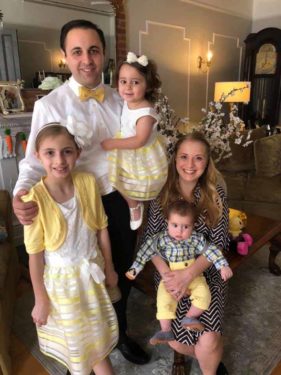By Michelle Powers

With an infant, a toddler and a pre-teen, Maria Heyer is on ‘mommy patrol’ around the clock. But her home wasn’t always a constant symphony of cries for attention and whines for baby bottles. The Heyer house used to be quiet.
The Heyer’s are part of a big Italian family in the middle of a large Italian parish. They were expected to have a baby and they did. But it wasn’t until after their first-born that their plans of having a full house began to fall apart.
“Just like you look to blame yourself, you look to blame your spouse, you look to blame God,” says John when he thinks about the years he and his wife could not conceive. It seemed impossible. So began years of train rides to consultations and appointments, poking and prodding.
Maria, a devout Catholic, chose to refuse treatments that were supposed to ‘guarantee’ a pregnancy, like hormone injections and In Vitro Fertilization (IVF). Multiple doctors told her that IVF was the only way and if she didn’t want to go through with it, her only alternative was to sit back and relax with a glass of wine.
Desperate for the family of their dreams, the couple even asked the Bishop of Brooklyn for advice. Bishop Nicholas DiMarzio gave them a third class relic of St. Gerard Majella, the patron priest of expectant mothers and unborn children. But the relic didn’t seem to work either. After nearly six years of trying, the Heyer’s were giving up. Their marriage was being pushed to the brink. Then someone told them about the Gianna Center.
“The job of any doctor is to figure out what is causing the symptoms, says Dr. Paul Carpentier, “and infertility is a symptom. It’s a sign that something is going wrong.” Dr. Carpentier is the medical director at the Gianna Center, a small Catholic health center that specializes in women’s health and fertility. He’s one of the first family physicians trained in ‘NaProTechnology,’ a natural medical approach to treating women’s reproductive disorders.
“They went step-by-step to diagnose what could have been preventing fertility,” says John, “as opposed to just trying to get her pregnant.” This was the kind of care the Heyer’s were looking for all along.
NaProTechnology is a restorative reproductive medicine, based on figuring out what’s wrong through tests and studies. As Dr. Carpentier explains, sometimes it takes more than just testing. What’s wrong could be revealed by simply listening and spending more time with your patients.
Catholic Health Services allows on average one hour with patients. Across the United States, some doctors only spend seven minutes with their patients. Dr. Carpentier says it’s just not possible to really know what is going on in someone’s body in that brief amount of time.
Through simple blood tests and conversations, Maria found out she had endometrioses. Soon after she had surgery, the Heyer’s had an announcement to make. They were expecting a baby girl.
Maria credits NaProTechnology for the birth of her children. The success rate is the same as IVF, but the prematurity rate – six times less than IVF. Dr. Carpentier says, through NaProTechnology, they are saving “one embryo at a time.”
Less than a year after their second born, the Heyer’s had another baby. This one was born on the Feast Day of St Gerard Majella. “I really believe that if you have faith, you don’t believe in coincidences, you believe in miracles and providence…and things happen for a reason,” says John.
The Heyer’s say they are hanging onto the relic, but one day, they might give it to another couple that just might need a little faith.
Editor’s Note: John Heyer is the Director of the Annual Catholic Appeal and Special Assistant to the Vicar for Development for the Diocese of Brooklyn.
